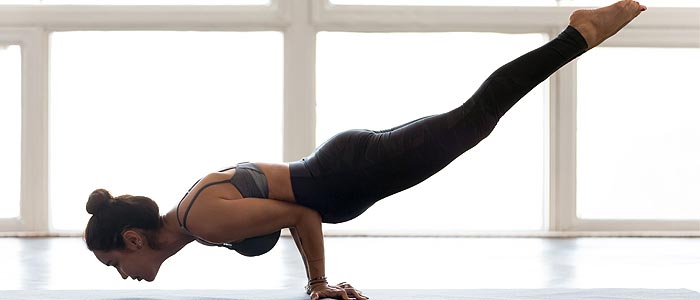What are the Health Benefits of Yoga?
21st Oct 19

Yoga is an ancient form of exercise that focuses on strength, balance, flexibility and breathing. Regular yoga practice has a wealth of benefits. Find out more below…
Want to move fast? Jump to the right section below.
What is Yoga?

Yoga is an ancient practice that combines the spiritual, physical and mental aspects of the body. The word itself comes from the old Sanskrit word for ‘union’, whereby the spirit, mind and body are not separate entities but are completely intertwined.
Yoga focuses on breath and relaxation, combined with many different postures that improve strength, balance, and flexibility. It brings a sense of completeness to your day, harmonising the different aspects of your life into one central space.
Over the last decade, yoga has become hugely popular. It is a different way to look at exercise and movement, as there is such a large focus on the mental side of things. But there are also many benefits to the rest of your body.
Relaxation & Meditation
The first benefit of yoga is creating peace and clarity in the mind. When practicing yoga, the goal is not to be controlled by your thoughts. Instead, these thoughts can be acknowledged but then allowed to pass. This keeps the mind clear. In time, and with regular practice, this can greatly benefit people who suffer from anxiety.
Yoga encourages us to focus on simple things, such as breathing. By focusing on our breath, we are able to centre ourselves and ‘live in the moment’. It is a hugely meditative exercise.
Flexibility
Improved flexibility is just one of the benefits of yogas. As you flow through the poses, your body becomes more supple and agile. The more you practice, the more you will improve.
Of course, some worry that they’re not flexible enough to do yoga, which simply isn’t true. Anyone can practice yoga, no matter their age, gender or ability. Yoga doesn’t discriminate; that’s part of the beauty of it. If you are a yoga novice, there are plenty of resources out there to get you started, such as our yoga guide for beginners, which is a great starting point.
Remember, flexibility is a variable and improving factor, not the be-all and end-all when it comes to yoga.
Strength
While yoga is a relaxing and mindful form of exercise, it can still be very challenging in terms of developing your strength.
As a full-body exercise, yoga does require a level of strength to hold poses. This something that improves with time. If you are a beginner, you can modify all poses to begin with before building up to a more challenging version of the pose. Accessories such as yoga blocks and straps are also handy when it comes to strength building and support.
As you move onto more advanced poses, you will find that the workout increases in difficulty, and that’s great. Your yoga practice can grow with you, really pushing you to your limits.
Balance

Yoga is also great for improving your balance. Each pose will test your stability in a different way, gradually improving so that you can hold even the most difficult position.
One thing to remember is that balance not only requires strength but mental focus, too. As you improve your balance, you’ll also be increasing your strength and concentration, which will really come into play when you move on to more advanced moves. You’ll also notice some big improvements in other types of exercise, such as weight training and cardio, where you’re bound to feel more strong, sturdy and in control.
Each of these benefits is great for your physical and mental health. As you delve deeper into your yoga practice and make it a regular part of your life, you’ll realise its potential and what it has to offer you. For more information, take a look at the Yoga Journal and also the NHS guide to yoga.

Before beginning any exercise or nutrition program, consult your physician, doctor or other professional. This is especially important for individuals over the age of 35 or persons with pre-existing health problems. Exercise.co.uk assumes no responsibility for personal injury or property damage sustained using our advice.
If you experience dizziness, nausea, chest pain, or any other abnormal symptoms, stop the workout at once and consult a physician or doctor immediately.









